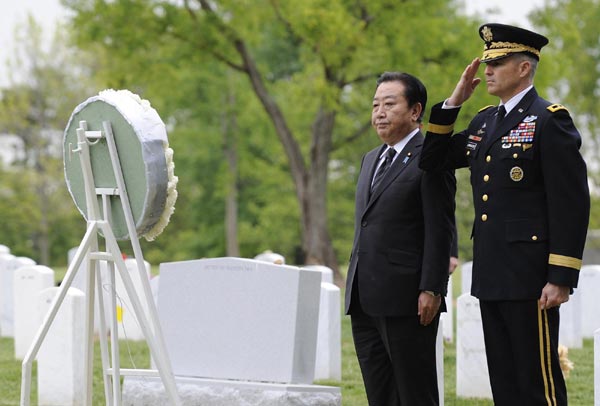
 |
|
Japan's Prime Minister Yoshihiko Noda (2nd R) stands with US Army Major General Michael Linnington, commander of the Military District of Washington, after placing a wreath amongst graves in Section 60, where US servicemen and servicewomen from the Iraq and Afghanistan wars are buried, at Arlington National Cemetery in Arlington, Virginia, April 30, 2012. Noda arrives in Washington to meet US President Barack Obama days after the United States and Japan revised plans to reorganize and streamline US bases on the Japanese island of Okinawa, allowing the allies to move toward closer military cooperation in the region. [Photo/Agencies] |
The details of the talks between Obama and Noda, the first Japanese leader to be hosted at the White House since his Democratic Party of Japan came to power in 2009, were not immediately clear.
In a news conference after their meeting, both leaders highlighted their earlier, long-anticipated agreement to move some 9,000 US Marines on Japan's Okinawa Island to other regions in the Pacific region.
The move will see the US streamline its military presence in Japan, now with about 50,000 troops, around the Western Pacific, as Washington forged closer military ties with traditional allies such as the Philippines, Australia and Singapore in recent months.
Obama reiterated support on Monday for Japan to join talks with the US and eight other countries, including Vietnam and Australia, on a Washington-led free trade agreement in the Asia-Pacific. He said the proposed trade pact would benefit both the American and Japanese economies and the region.
Noda, for his part, sounded conservative. "In the economic area, we shall deepen bilateral economic ties and fortify the growth and prosperity of the two countries through the promotion of economic integration in the Asia-Pacific region," he said.
"Our countries will work on regional trade and investment rules-making with a view to building FTAAP, or the Free Trade Area of the Asian-Pacific," he said, referring to a longer-term goal of crafting a free trade pact among all 21 members of APEC, a broader group of regional economies.
That "will advance consultations with a view to participating in the Trans-Pacific Partnership negotiations", Noda said.
Beijing is working on a free trade agreement with both Tokyo and Seoul. China and South Korea, both members of the Asia Pacific Economic Cooperation, are not included in the TPP, which many see as an idea to counter China's economic rise.
Speaking of his talks with Noda, Obama on Monday said: "All of our actions are not designed to in any way contain China."
"But they are designed to ensure that they (China) are part of a broader international community in which rules, norms are respected, in which all countries can prosper and succeed," Obama said.
"We want China to be strong, and we want it to be prosperous. And we're very pleased with all the areas of cooperation that we've been able to engage in," he said.
US Secretary of State Hillary Clinton, the host of a gala dinner for Obama and Noda after Monday's joint news conference, was scheduled to leave for Beijing later the same day. She and US Treasury Secretary Timothy Geithner will attend the annual China-US Strategic and Economic Dialogue on Thursday and Friday.
Hu Yinan in Beijing contributed to this story.